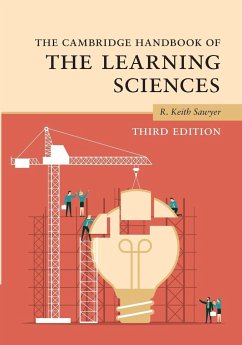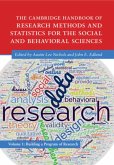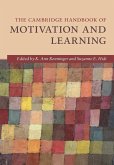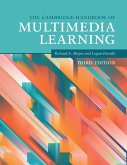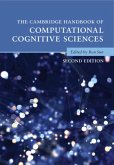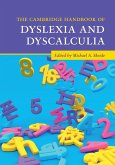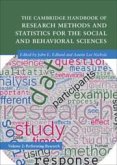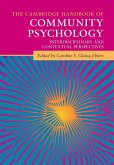The Cambridge Handbook of the Learning Sciences
Herausgeber: Sawyer, R. Keith
The Cambridge Handbook of the Learning Sciences
Herausgeber: Sawyer, R. Keith
- Broschiertes Buch
- Merkliste
- Auf die Merkliste
- Bewerten Bewerten
- Teilen
- Produkt teilen
- Produkterinnerung
- Produkterinnerung
The Cambridge Handbook of the Learning Sciences provides research-grounded practical information for how to organize a classroom, how to write textbooks, how to design educational software and instructional technology, how to prepare effective teachers, and how to best use the Internet to enhance student learning.
Andere Kunden interessierten sich auch für
![The Cambridge Handbook of Research Methods and Statistics for the Social and Behavioral Sciences The Cambridge Handbook of Research Methods and Statistics for the Social and Behavioral Sciences]() The Cambridge Handbook of Research Methods and Statistics for the Social and Behavioral Sciences84,99 €
The Cambridge Handbook of Research Methods and Statistics for the Social and Behavioral Sciences84,99 €![The Cambridge Handbook of Motivation and Learning The Cambridge Handbook of Motivation and Learning]() K. Ann Renninger (Pennsylvania Swarthmore College)The Cambridge Handbook of Motivation and Learning84,99 €
K. Ann Renninger (Pennsylvania Swarthmore College)The Cambridge Handbook of Motivation and Learning84,99 €![The Cambridge Handbook of Multimedia Learning The Cambridge Handbook of Multimedia Learning]() The Cambridge Handbook of Multimedia Learning86,99 €
The Cambridge Handbook of Multimedia Learning86,99 €![The Cambridge Handbook of Computational Cognitive Sciences The Cambridge Handbook of Computational Cognitive Sciences]() The Cambridge Handbook of Computational Cognitive Sciences411,99 €
The Cambridge Handbook of Computational Cognitive Sciences411,99 €![The Cambridge Handbook of Dyslexia and Dyscalculia The Cambridge Handbook of Dyslexia and Dyscalculia]() The Cambridge Handbook of Dyslexia and Dyscalculia60,99 €
The Cambridge Handbook of Dyslexia and Dyscalculia60,99 €![The Cambridge Handbook of Research Methods and Statistics for the Social and Behavioral Sciences: Volume 2 The Cambridge Handbook of Research Methods and Statistics for the Social and Behavioral Sciences: Volume 2]() The Cambridge Handbook of Research Methods and Statistics for the Social and Behavioral Sciences: Volume 285,99 €
The Cambridge Handbook of Research Methods and Statistics for the Social and Behavioral Sciences: Volume 285,99 €![The Cambridge Handbook of Community Psychology The Cambridge Handbook of Community Psychology]() The Cambridge Handbook of Community Psychology64,99 €
The Cambridge Handbook of Community Psychology64,99 €-
-
-
The Cambridge Handbook of the Learning Sciences provides research-grounded practical information for how to organize a classroom, how to write textbooks, how to design educational software and instructional technology, how to prepare effective teachers, and how to best use the Internet to enhance student learning.
Hinweis: Dieser Artikel kann nur an eine deutsche Lieferadresse ausgeliefert werden.
Hinweis: Dieser Artikel kann nur an eine deutsche Lieferadresse ausgeliefert werden.
Produktdetails
- Produktdetails
- Cambridge Handbooks in Psychology
- Verlag: Cambridge University Press
- 3 Revised edition
- Seitenzahl: 746
- Erscheinungstermin: 7. April 2022
- Englisch
- Abmessung: 254mm x 178mm x 40mm
- Gewicht: 1376g
- ISBN-13: 9781108744669
- ISBN-10: 1108744664
- Artikelnr.: 63264561
- Herstellerkennzeichnung
- Libri GmbH
- Europaallee 1
- 36244 Bad Hersfeld
- gpsr@libri.de
- Cambridge Handbooks in Psychology
- Verlag: Cambridge University Press
- 3 Revised edition
- Seitenzahl: 746
- Erscheinungstermin: 7. April 2022
- Englisch
- Abmessung: 254mm x 178mm x 40mm
- Gewicht: 1376g
- ISBN-13: 9781108744669
- ISBN-10: 1108744664
- Artikelnr.: 63264561
- Herstellerkennzeichnung
- Libri GmbH
- Europaallee 1
- 36244 Bad Hersfeld
- gpsr@libri.de
Preface R. Keith Sawyer; 1. An introduction to the learning sciences R.
Keith Sawyer; Part I. Foundations: 2. Foundations of the learning sciences
Mitchell J. Nathan, R. Keith Sawyer; 3. Scaffolding Brian J. Reiser, Iris
Tabak; 4. Project-based learning Joseph S. Krajcik, Namsoo Shin; 5.
Metacognition and self-regulated learning Philip H. Winne, Roger Azevedo;
6. A history of conceptual change research: Threads and fault lines Andrea
A. diSessa; 7. Learning in activity Yrjö Engeström; 8. Cognitive
apprenticeship Allan Collins, Manu Kapur; Part II. Methodologies: 9.
Design-based research: A methodological toolkit for engineering change
Sasha Barab; 10. Analyzing collaboration Noel Enyedy, Reed Stevens; 11.
Microgenetic methods Bruce L. Sherin, Clark A. Chinn; 12. A learning
sciences perspective on the design and use of assessment in education James
W. Pellegrino; 13. Learning analytics and educational data mining Ryan S.
Baker, George Siemens; Part III. Grounding Technology in the Learning
Sciences: 14. Videogames and learning Constance Steinkuehler, Kurt Squire;
15. Embodiment and embodied design Dor Abrahamson, Robb Lindgren; 16.
Tangible and Full-body interfaces in learning Narcis Pares, Michael
Eisenberg; 17. Augmented reality in the learning sciences Bertrand
Schneider, Iulian Radu; 18. Mobile learning Roy Pea, Mike Sharples; Part
IV. Learning Together: 19. Knowledge building and knowledge creation
Marlene Scardamalia, Carl Bereiter; 20. Computer-supported collaborative
learning Gerry Stahl, Timothy Koschmann, Daniel Suthers; 21. Arguing to
learn Jerry Andriessen, Michael Baker; 22. Informal learning in museums
Palmyre Pierroux, Karen Knutson, Kevin Crowley; Part V. Learning
Disciplinary Knowledge: 23. Research in mathematics education: What can it
teach us about human learning? Anna Sfard, Paul Cobb; 24. Science education
and the learning sciences: A coevolutionary connection Nancy Butler Songer,
Yael Kali; 25. Complex systems and the learning sciences: Educational,
theoretical, and methodological implications Michael J. Jacobson, Uri
Wilensky; 26. Learning history Mario Carretero, Everardo Perez-Majarrez;
27. Learning to be literate Peter Smagorinsky, Richard E. Mayer; 28. Arts
education and the learning sciences Erica Halverson, Kimberly Sheridan; 29.
Learning as a cultural process: Achieving equity through diversity Na'ilah
Suad Nasir, Ann S. Rosebery, Beth Warren, Carol D. Lee; 30. Designing for
meaningful learning: Interest, motivation, and engagement K. Ann Renninger,
Sanna Järvelä; 31. Advances in teacher learning research in the learning
sciences Barry J. Fishman, Carol K. K. Chan, Elizabeth A. Davis; 32.
Learning sciences and policy: A decade of mutual engagement William R.
Penuel, James P. Spillane, Min Sun; 33. The learning sciences in the 2020s:
Implications for schools and beyond R. Keith Sawyer.
Keith Sawyer; Part I. Foundations: 2. Foundations of the learning sciences
Mitchell J. Nathan, R. Keith Sawyer; 3. Scaffolding Brian J. Reiser, Iris
Tabak; 4. Project-based learning Joseph S. Krajcik, Namsoo Shin; 5.
Metacognition and self-regulated learning Philip H. Winne, Roger Azevedo;
6. A history of conceptual change research: Threads and fault lines Andrea
A. diSessa; 7. Learning in activity Yrjö Engeström; 8. Cognitive
apprenticeship Allan Collins, Manu Kapur; Part II. Methodologies: 9.
Design-based research: A methodological toolkit for engineering change
Sasha Barab; 10. Analyzing collaboration Noel Enyedy, Reed Stevens; 11.
Microgenetic methods Bruce L. Sherin, Clark A. Chinn; 12. A learning
sciences perspective on the design and use of assessment in education James
W. Pellegrino; 13. Learning analytics and educational data mining Ryan S.
Baker, George Siemens; Part III. Grounding Technology in the Learning
Sciences: 14. Videogames and learning Constance Steinkuehler, Kurt Squire;
15. Embodiment and embodied design Dor Abrahamson, Robb Lindgren; 16.
Tangible and Full-body interfaces in learning Narcis Pares, Michael
Eisenberg; 17. Augmented reality in the learning sciences Bertrand
Schneider, Iulian Radu; 18. Mobile learning Roy Pea, Mike Sharples; Part
IV. Learning Together: 19. Knowledge building and knowledge creation
Marlene Scardamalia, Carl Bereiter; 20. Computer-supported collaborative
learning Gerry Stahl, Timothy Koschmann, Daniel Suthers; 21. Arguing to
learn Jerry Andriessen, Michael Baker; 22. Informal learning in museums
Palmyre Pierroux, Karen Knutson, Kevin Crowley; Part V. Learning
Disciplinary Knowledge: 23. Research in mathematics education: What can it
teach us about human learning? Anna Sfard, Paul Cobb; 24. Science education
and the learning sciences: A coevolutionary connection Nancy Butler Songer,
Yael Kali; 25. Complex systems and the learning sciences: Educational,
theoretical, and methodological implications Michael J. Jacobson, Uri
Wilensky; 26. Learning history Mario Carretero, Everardo Perez-Majarrez;
27. Learning to be literate Peter Smagorinsky, Richard E. Mayer; 28. Arts
education and the learning sciences Erica Halverson, Kimberly Sheridan; 29.
Learning as a cultural process: Achieving equity through diversity Na'ilah
Suad Nasir, Ann S. Rosebery, Beth Warren, Carol D. Lee; 30. Designing for
meaningful learning: Interest, motivation, and engagement K. Ann Renninger,
Sanna Järvelä; 31. Advances in teacher learning research in the learning
sciences Barry J. Fishman, Carol K. K. Chan, Elizabeth A. Davis; 32.
Learning sciences and policy: A decade of mutual engagement William R.
Penuel, James P. Spillane, Min Sun; 33. The learning sciences in the 2020s:
Implications for schools and beyond R. Keith Sawyer.
Preface R. Keith Sawyer; 1. An introduction to the learning sciences R.
Keith Sawyer; Part I. Foundations: 2. Foundations of the learning sciences
Mitchell J. Nathan, R. Keith Sawyer; 3. Scaffolding Brian J. Reiser, Iris
Tabak; 4. Project-based learning Joseph S. Krajcik, Namsoo Shin; 5.
Metacognition and self-regulated learning Philip H. Winne, Roger Azevedo;
6. A history of conceptual change research: Threads and fault lines Andrea
A. diSessa; 7. Learning in activity Yrjö Engeström; 8. Cognitive
apprenticeship Allan Collins, Manu Kapur; Part II. Methodologies: 9.
Design-based research: A methodological toolkit for engineering change
Sasha Barab; 10. Analyzing collaboration Noel Enyedy, Reed Stevens; 11.
Microgenetic methods Bruce L. Sherin, Clark A. Chinn; 12. A learning
sciences perspective on the design and use of assessment in education James
W. Pellegrino; 13. Learning analytics and educational data mining Ryan S.
Baker, George Siemens; Part III. Grounding Technology in the Learning
Sciences: 14. Videogames and learning Constance Steinkuehler, Kurt Squire;
15. Embodiment and embodied design Dor Abrahamson, Robb Lindgren; 16.
Tangible and Full-body interfaces in learning Narcis Pares, Michael
Eisenberg; 17. Augmented reality in the learning sciences Bertrand
Schneider, Iulian Radu; 18. Mobile learning Roy Pea, Mike Sharples; Part
IV. Learning Together: 19. Knowledge building and knowledge creation
Marlene Scardamalia, Carl Bereiter; 20. Computer-supported collaborative
learning Gerry Stahl, Timothy Koschmann, Daniel Suthers; 21. Arguing to
learn Jerry Andriessen, Michael Baker; 22. Informal learning in museums
Palmyre Pierroux, Karen Knutson, Kevin Crowley; Part V. Learning
Disciplinary Knowledge: 23. Research in mathematics education: What can it
teach us about human learning? Anna Sfard, Paul Cobb; 24. Science education
and the learning sciences: A coevolutionary connection Nancy Butler Songer,
Yael Kali; 25. Complex systems and the learning sciences: Educational,
theoretical, and methodological implications Michael J. Jacobson, Uri
Wilensky; 26. Learning history Mario Carretero, Everardo Perez-Majarrez;
27. Learning to be literate Peter Smagorinsky, Richard E. Mayer; 28. Arts
education and the learning sciences Erica Halverson, Kimberly Sheridan; 29.
Learning as a cultural process: Achieving equity through diversity Na'ilah
Suad Nasir, Ann S. Rosebery, Beth Warren, Carol D. Lee; 30. Designing for
meaningful learning: Interest, motivation, and engagement K. Ann Renninger,
Sanna Järvelä; 31. Advances in teacher learning research in the learning
sciences Barry J. Fishman, Carol K. K. Chan, Elizabeth A. Davis; 32.
Learning sciences and policy: A decade of mutual engagement William R.
Penuel, James P. Spillane, Min Sun; 33. The learning sciences in the 2020s:
Implications for schools and beyond R. Keith Sawyer.
Keith Sawyer; Part I. Foundations: 2. Foundations of the learning sciences
Mitchell J. Nathan, R. Keith Sawyer; 3. Scaffolding Brian J. Reiser, Iris
Tabak; 4. Project-based learning Joseph S. Krajcik, Namsoo Shin; 5.
Metacognition and self-regulated learning Philip H. Winne, Roger Azevedo;
6. A history of conceptual change research: Threads and fault lines Andrea
A. diSessa; 7. Learning in activity Yrjö Engeström; 8. Cognitive
apprenticeship Allan Collins, Manu Kapur; Part II. Methodologies: 9.
Design-based research: A methodological toolkit for engineering change
Sasha Barab; 10. Analyzing collaboration Noel Enyedy, Reed Stevens; 11.
Microgenetic methods Bruce L. Sherin, Clark A. Chinn; 12. A learning
sciences perspective on the design and use of assessment in education James
W. Pellegrino; 13. Learning analytics and educational data mining Ryan S.
Baker, George Siemens; Part III. Grounding Technology in the Learning
Sciences: 14. Videogames and learning Constance Steinkuehler, Kurt Squire;
15. Embodiment and embodied design Dor Abrahamson, Robb Lindgren; 16.
Tangible and Full-body interfaces in learning Narcis Pares, Michael
Eisenberg; 17. Augmented reality in the learning sciences Bertrand
Schneider, Iulian Radu; 18. Mobile learning Roy Pea, Mike Sharples; Part
IV. Learning Together: 19. Knowledge building and knowledge creation
Marlene Scardamalia, Carl Bereiter; 20. Computer-supported collaborative
learning Gerry Stahl, Timothy Koschmann, Daniel Suthers; 21. Arguing to
learn Jerry Andriessen, Michael Baker; 22. Informal learning in museums
Palmyre Pierroux, Karen Knutson, Kevin Crowley; Part V. Learning
Disciplinary Knowledge: 23. Research in mathematics education: What can it
teach us about human learning? Anna Sfard, Paul Cobb; 24. Science education
and the learning sciences: A coevolutionary connection Nancy Butler Songer,
Yael Kali; 25. Complex systems and the learning sciences: Educational,
theoretical, and methodological implications Michael J. Jacobson, Uri
Wilensky; 26. Learning history Mario Carretero, Everardo Perez-Majarrez;
27. Learning to be literate Peter Smagorinsky, Richard E. Mayer; 28. Arts
education and the learning sciences Erica Halverson, Kimberly Sheridan; 29.
Learning as a cultural process: Achieving equity through diversity Na'ilah
Suad Nasir, Ann S. Rosebery, Beth Warren, Carol D. Lee; 30. Designing for
meaningful learning: Interest, motivation, and engagement K. Ann Renninger,
Sanna Järvelä; 31. Advances in teacher learning research in the learning
sciences Barry J. Fishman, Carol K. K. Chan, Elizabeth A. Davis; 32.
Learning sciences and policy: A decade of mutual engagement William R.
Penuel, James P. Spillane, Min Sun; 33. The learning sciences in the 2020s:
Implications for schools and beyond R. Keith Sawyer.

